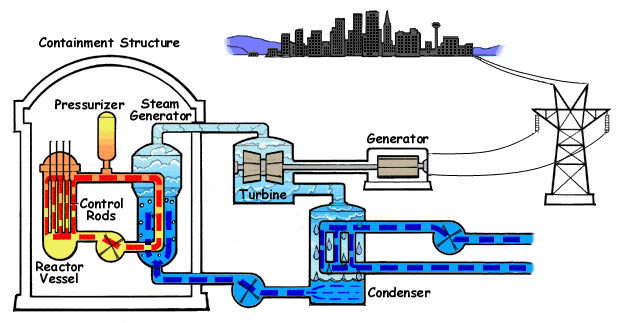Living within 100 miles of the only commercially owned nuclear power plant in my area I decided to look into the history of the plant and what would happen if a nuclear plant went down unexpectedly and how it would affect the surrounding population.
The nuclear power plant has already had an effect on the ground water. Back in 2014 the NRC found traces of nuclear contamination in the ground water.
http://krcgtv.com/news/neighborhood/callaway-nuclear-plant-well-water-samples-have-radioactivity?id=1079567
Nuclear power actually has an excellent safety record, with only three major accidents in over 50 years. In fact, no member of the public has been injured or killed in the entire 50-year history of commercial nuclear power in the U.S. But nuclear safety is closely linked with security, and the possibility of terrorism has joined the safety risks like aging equipment and operator error in fueling fears of a nuclear power plant event that could put the public at risk.
Nuclear power plants generate electricity by converting water to steam, using the heat generated by splitting uranium or plutonium atoms in a process called nuclear fission. Though nuclear fission doesn’t directly produce radiation, it does result in the creation of unstable radioactive particles which create radiation as they decay. The power generator as a whole is referred to as a nuclear reactor, and the part of the reactor in which the fission takes place is a closed environment called the core.

Complex cooling and containment systems are used to protect the core and its contents from the heat generated by the fission process. The worst-case nuclear accident scenario is often referred to as a meltdown, which can be defined as an overheating accident in which the reactor core is damaged and radiation is released into the environment.
While even a partial meltdown is extremely serious, it’s important to separate fact from speculation and myth; fears that a meltdown can turn a power plant into a massive nuclear bomb are scientifically baseless. According to the Center For Nuclear Science And Technology Information, nuclear weapons
detonate because they contain particular configurations of specific materials that are not present in nuclear reactors.

It’s also important to understand that a meltdown doesn’t necessarily equate with a massive and catastrophic radiation release. Ukraine’s 1986 Chernobyl disaster, in which a total of 30 people died from acute radiation poisoning, was the only accident in the history of commercial nuclear power in which radiation-related fatalities occurred. The other two serious nuclear power plant accidents – Three Mile Island in the US and Fukushima Daichii in Japan – involved partial meltdowns of one or more reactors, but in both cases, the radiation escape was minimized, and neither accident resulted in any deaths or cases of radiation poisoning.
However, the fact remains that any radiation escape is critical, and radiation exposure is the number one danger posed to the public by a nuclear crisis.
If you’re instructed to remain in place, stay where you are and don’t attempt evacuation. Depending on the nature of the emergency and a variety of environmental factors such as wind speed and direction, evacuation could be much more dangerous than staying in place. If you are instructed to evacuate, do so immediately. If authorities specify a certain route or tell you to travel a certain distance from your current location, follow instructions without deviation.
Great info man....
Here in U.K. just about everyone is no more than 60miles away from a nuclear power station...It joins the queue of hazards that i have on my list and one which i haven't really delved into that much..
Your post has me thinking now to re-evaluate any plans i may have.
Downvoting a post can decrease pending rewards and make it less visible. Common reasons:
Submit
Thanks pvuk. It’s a strange place for sure. Needs plenty of regulation and experimentation to be as safe as it needs to be. Living that close to the plant and being able to see it on a good clear day can be awe inspiring to some but to me it’s terrifying.
Downvoting a post can decrease pending rewards and make it less visible. Common reasons:
Submit
Congratulations! This post has been upvoted from the communal account, @minnowsupport, by ToatSoul from the Minnow Support Project. It's a witness project run by aggroed, ausbitbank, teamsteem, theprophet0, someguy123, neoxian, followbtcnews, and netuoso. The goal is to help Steemit grow by supporting Minnows. Please find us at the Peace, Abundance, and Liberty Network (PALnet) Discord Channel. It's a completely public and open space to all members of the Steemit community who voluntarily choose to be there.
If you would like to delegate to the Minnow Support Project you can do so by clicking on the following links: 50SP, 100SP, 250SP, 500SP, 1000SP, 5000SP.
Be sure to leave at least 50SP undelegated on your account.
Downvoting a post can decrease pending rewards and make it less visible. Common reasons:
Submit